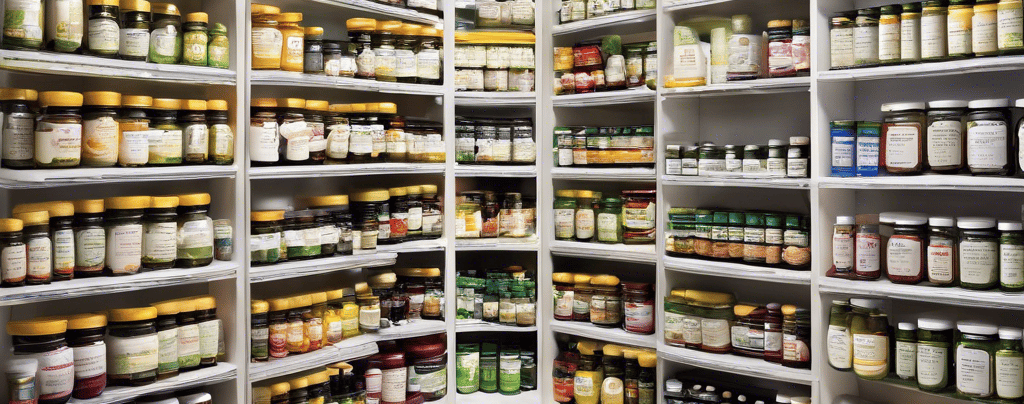Take advantage of discounts on our products!
21-Day Culinary Plan for Lasting Health
Explore our comprehensive 21-day culinary plan designed for lasting health restoration. Each week focuses on detox and nourish, restore and revitalize, and healing and sustaining. Enjoy delicious meals that boost metabolism, enhance wellness, and foster lifelong healthy habits.
HEALTH AND WELL-BEING
Holistic Care
12/1/2024
Introduction to the 21-Day Culinary Routine
Embarking on a journey towards lasting good health through a 21-day culinary routine is not just about temporary dietary changes, but rather a holistic approach to cultivating sustainable wellness habits. This article delves into the fundamental principles of nourishing your body with nutrient-dense foods, planning meals effectively, and embracing the benefits of consistent meal preparation. By exploring flavorful and healthy recipe options, managing portions mindfully, and setting realistic health goals, you can lay the groundwork for a healthier lifestyle that extends far beyond the initial 21 days. Join us on this culinary adventure as we guide you through a transformative experience of revitalizing your health and well-being.
Understanding the Importance of Consistent Eating Habits
Let's be real, our relationship with food can sometimes resemble a rollercoaster ride - filled with ups, downs, and maybe even a few loop-de-loops. But consistent eating habits are like that reliable friend who always has your back. They provide stability, energy, and overall good vibes for your body and mind.
Setting Realistic Health Goals for the 21-Day Program
When embarking on any health journey, it's essential to set goals that are as realistic as finding a pair of comfy leggings with functional pockets - achievable and practical. Whether it's saying 'adios' to sugar-loaded snacks or incorporating more leafy greens into your diet, setting realistic goals will help you stay motivated throughout this 21-day culinary rodeo.
1. Planning Your Meals for Sustainable Health
Crafting a Balanced Meal Plan for the Week
Meal planning is like playing a strategic game of culinary chess, but without the confusing rules. By crafting a balanced meal plan for the week, you're not just filling your plate; you're nourishing your body with the nutrients it craves. Plus, it's a great way to avoid the dreaded 'What's for dinner?' dilemma that often strikes at 6 pm on a weeknight.
Utilizing Meal Prep Strategies for Efficiency
Who has the time or the patience to cook every single day? Enter meal prep - the superhero of busy bees and lazy pandas alike. By chopping, marinating, and pre-cooking ingredients in advance, you'll breeze through your week like a culinary maestro. Plus, it's a great excuse to show off your matching Tupperware collection.
2. Incorporating Nutrient-Dense Foods Into Your Diet
Identifying Nutrient-Rich Foods for Optimal Health
Forget about counting calories like they're the latest TikTok trend. Instead, focus on incorporating foods that are chock-full of nutrients - think colorful fruits and veggies, lean proteins, and whole grains. These nutritional powerhouses will be your best mates on this 21-day food adventure.
Creating Colorful and Diverse Plates for Nutritional Variety
Eating the same beige-colored meals day in and day out? Boring. Spice up your plate (literally) by incorporating a rainbow of colors and flavors. Not only will your meals look Instagram-worthy, but they'll also provide your body with a variety of essential nutrients. It's like giving your taste buds a mini vacation around the world.
3. The Benefits of Consistent Meal Preparation
Streamlining Your Cooking Process for Convenience
Have you ever felt like a contestant on a frantic cooking show with ingredients flying everywhere? Consistent meal preparation is here to save the day. By streamlining your cooking process and having ingredients ready to go, you'll breeze through mealtime like a seasoned chef - minus the stress and the Gordon Ramsay attitude.
Reducing Food Waste Through Thoughtful Meal Planning
Food waste is so last season. With thoughtful meal planning, you'll not only save money but also help reduce your impact on the environment. By using up ingredients before they turn into science experiments in your fridge, you'll feel like a culinary superhero fighting the good fight against wasted food.
4. Exploring Flavorful and Healthy Recipe Options
Experimenting with Herbs and Spices for Taste Enhancement
Tired of bland meals? Spice up your culinary routine by experimenting with herbs and spices! From aromatic basil to zesty cumin, these flavor enhancers can take your dishes from drab to fab in no time.
Discovering New Cooking Techniques for Healthier Meals
Step out of your comfort zone and try new cooking techniques to create healthier meals. Whether it's steaming, grilling, or roasting, exploring different methods can help retain nutrients and flavors, making your dishes both delicious and nutritious.
5. Managing Portions and Mindful Eating Habits
Practicing Portion Control for Balanced Nutrition
In a world of oversized portions, mastering portion control is key to maintaining balanced nutrition. By being mindful of serving sizes and listening to your body's hunger cues, you can enjoy your favorite foods without overindulging.
Cultivating Mindful Eating Practices for Better Digestion
Slow down, savor each bite, and tune in to your body's signals with mindful eating practices. By paying attention to the texture, taste, and satisfaction level of your meals, you can improve digestion, prevent overeating, and truly appreciate the nourishment you're providing your body.
6. Sustaining Good Health Beyond the 21-Day Program
Creating a Long-Term Dietary Plan for Continued Wellness
Don't let your hard work go to waste! Develop a long-term dietary plan that suits your lifestyle and health goals to sustain the benefits of the 21-day program. Incorporate a variety of nutrient-dense foods, stay hydrated, and practice moderation for lasting good health.
Incorporating Regular Physical Activity for Overall Health Maintenance
Eating well is only half the battle! To maintain overall health, don't forget to incorporate regular physical activity into your routine. Whether it's a brisk walk, yoga session, or dance class, staying active not only boosts your physical health but also uplifts your mood and energy levels.
As you conclude this 21-day culinary journey towards lasting good health, remember that the habits you've cultivated are the building blocks for a healthier future. By incorporating nutrient-dense foods, planning meals strategically, and embracing mindful eating practices, you have taken significant strides towards enhancing your overall well-being. Continue to prioritize your health by sustaining these positive habits, exploring new recipes, and staying committed to a balanced lifestyle. Cheers to your continued journey towards lasting good health!
FAQ - the 21-Day Culinary Routine
1. Can I customize the 21-day culinary routine to accommodate dietary restrictions or preferences?
Can I customize the 21-day culinary routine to accommodate dietary restrictions or preferences?Absolutely! The 21-day culinary routine is designed with flexibility in mind, allowing you to tailor it to your specific dietary restrictions or preferences. Whether you're managing food allergies, following a vegan or vegetarian lifestyle, or simply looking to incorporate more whole foods, there are plenty of options to make it work for you.
You can swap out ingredients for alternatives that better suit your dietary needs; for instance, if a recipe calls for dairy, consider using nut milks or plant-based yogurts. Similarly, if gluten is a concern, you can choose gluten-free grains and flours.
Moreover, feel free to mix and match meals throughout the week. If a certain recipe doesn’t align with your preferences, substitute it with a dish you enjoy. The key is to stay within the framework of balanced nutrition while ensuring that each meal resonates with your tastes and nutritional goals.
Listening to your body and honoring its needs is paramount, so take the creative reins and make this culinary journey truly your own!
2. How can I stay motivated and committed to the program throughout the 21 days?
To stay motivated and committed to the program throughout the 21 days, it’s essential to set clear and achievable goals. Break down your larger objectives into smaller, manageable tasks that you can tackle daily. This will help you track your progress and feel a sense of accomplishment along the way.
Creating a routine is another crucial factor. Establish a specific time each day to dedicate to the program, whether it’s in the morning, during lunch, or in the evening. Consistency will help form the habit and make it easier to stick with it.
Additionally, find a support system. Share your journey with friends, family, or a community who shares similar goals. Engaging with others who are also committed can provide encouragement and accountability, making it easier to stay on track.
Remind yourself of the reasons you started the program in the first place. Write down your motivations and read them regularly to reignite your passion and commitment. Visualization can also be powerful – imagine the success you’ll feel after completing the program and what it will mean for your goals.
Finally, celebrate your achievements, no matter how big or small. Reward yourself when you hit milestones, and reflect on your progress to reinforce the positive changes you’re making. Keeping your mindset focused on growth and progress will help you maintain the motivation you need to see the program through to the end.
3. What are some practical tips for managing meal preparation within a busy schedule?
3.1. Plan Ahead :
Dedicate a few minutes each week to create a meal plan. Jot down what you’d like to eat and make a grocery list. This will not only simplify shopping but also save you time during the week.
3.2. Batch Cooking :
Choose a day (like Sunday) to cook larger portions of meals that can be easily stored in the fridge or freezer. Dishes like soups, stews, or casseroles can be made in bulk and portioned out for the week.
3.3. Utilize Simple Recipes :
Focus on quick, easy recipes with minimal ingredients. Stir-fries, salads, or sheet pan meals can be prepared in under 30 minutes and are often adaptable to whatever you have on hand.
3.4. Prep Ingredients :
Take time to wash, chop, and organize your vegetables and proteins ahead of time. Store prepped items in clear containers and label them. This makes it easier to toss together meals when you're short on time.
3.5. Invest in Quality Containers :
Having an assortment of containers for storing prepped meals and leftovers can help keep your refrigerator organized. Look for stackable options to maximize space.
3.6. Make Use of Snacks :
Incorporate healthy snacks into your meal prep. Having fruits, nuts, and yogurt ready to grab will keep you fueled and lessen the temptation to skip meals.
3.7. One-Pan Wonders :
Look for recipes that require minimal cleanup, such as one-pot, one-pan, or slow-cooker meals. This reduces not only your cooking time but also the post-meal cleanup.
3.8. Embrace Freezer Meals :
Consider preparing meals specifically for the freezer. Dishes like chili, lasagna, or smoothie packs can be made in advance, stored, and enjoyed later with minimal effort.
3.9. Set Reminders :
Use your phone or a calendar to set reminders for meal prep sessions and grocery shopping. Staying organized can help keep you on track.
3.10. Stay Flexible :
Life can get hectic, so it’s important to adapt your meal prep to your schedule. If plans change, don’t hesitate to swap out a meal or reallocate leftovers to avoid waste.
By implementing these practical tips, you can streamline your meal preparation and enjoy healthier home-cooked meals, even with a busy lifestyle.










